Key takeaways:
- Pro-life advocacy emphasizes valuing human life from conception to natural death, focusing on compassion, support, and understanding rather than merely opposing abortion.
- Building strong community connections and leveraging storytelling are key strategies for effective pro-life activism, helping to transform perceptions and foster meaningful discussions.
- Personal challenges in advocacy include dealing with anxiety, backlash, and the need for self-care, highlighting the importance of resilience and self-compassion in the journey.
- Future goals for pro-life advocacy involve enhancing education on reproductive health, expanding outreach to underserved communities, and engaging policymakers to establish supportive legislation.
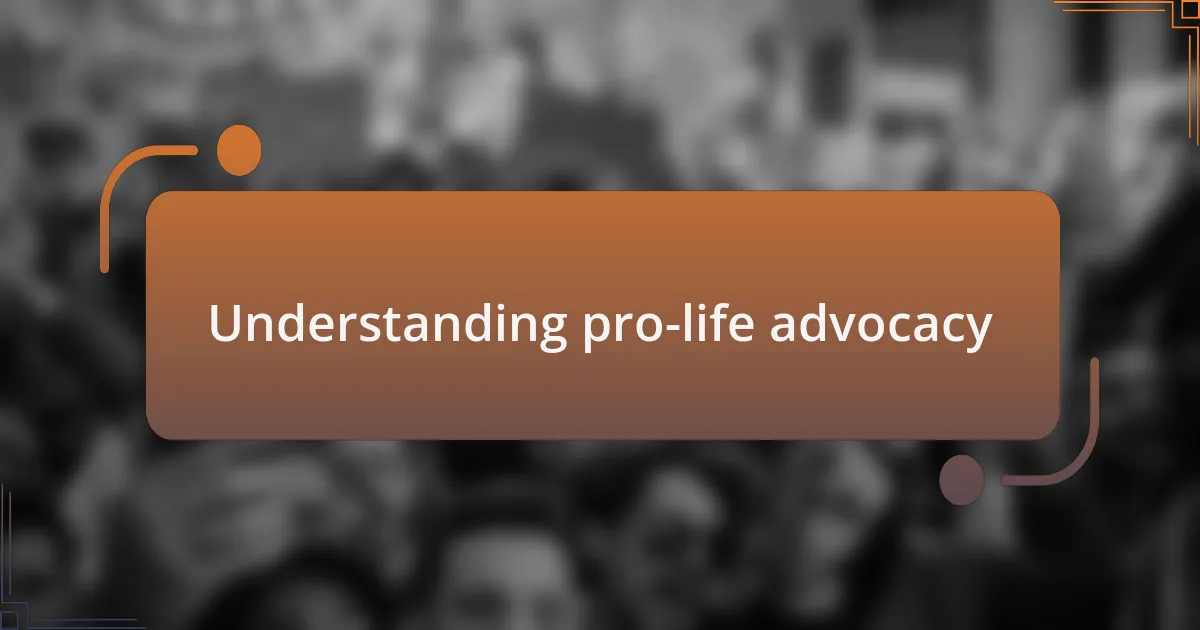
Understanding pro-life advocacy
Pro-life advocacy is fundamentally about valuing human life from conception to natural death. I recall a time when I attended a local rally, standing beside passionate individuals who believed deeply in the sanctity of life. Their stories, many filled with profound loss and personal struggle, made me reflect: What does it truly mean to protect life?
At its core, pro-life advocacy challenges us to consider the narratives behind every unborn child. I often find myself asking, “What future are we shaping for our children?” These questions drive home the point that the movement is not just about opposing abortion; it’s about fostering a culture that honors life in all its forms, from providing resources for mothers in crisis to supporting families facing difficult choices.
Through my journey, I’ve witnessed how pro-life advocacy extends beyond political lines—it’s deeply rooted in compassion and care. I remember a conversation with a friend who had experienced an unplanned pregnancy; her courage in facing societal judgment opened my eyes to the complexities that many women face. This understanding reinforces why advocacy should encompass support, education, and empathy, aimed at transforming lives rather than merely debating policies.
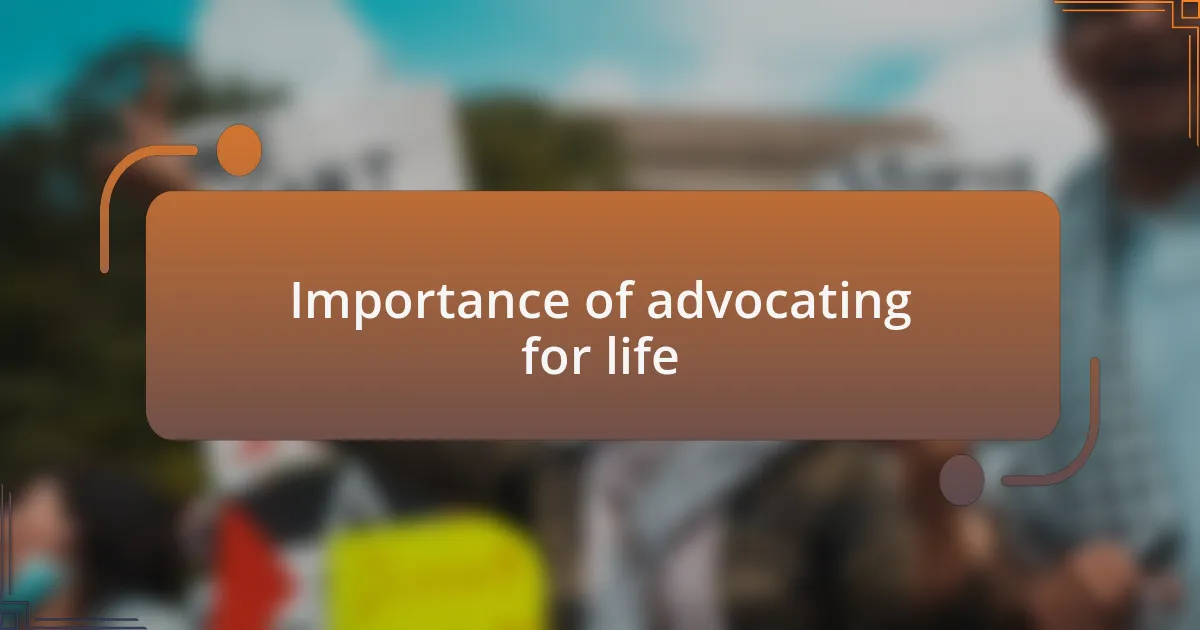
Importance of advocating for life
Advocating for life is essential because it creates a compassionate community where every person feels valued. I often reflect on my interactions with those who have faced difficult choices; their stories galvanize the pro-life message and highlight the importance of support and understanding. Have you ever considered how a single act of kindness can change someone’s perspective on life? It’s in these small yet significant moments that we see the profound impact of advocacy.
When I volunteered at a local pregnancy resource center, I was struck by how many women felt isolated in their struggles. Providing information and emotional support can transform fear into hope. I remember one mother who shared how a simple conversation made her feel less alone, reinstating her belief in herself and her ability to choose life for her child. Advocacy, in this way, is about creating safe spaces for voices that need to be heard.
Moreover, emphasizing the importance of advocating for life extends beyond immediate circumstances. It lays the groundwork for societal values that prioritize human dignity and empathy. I can’t help but wonder what kind of world we would live in if everyone committed to nurturing life in all its forms. Each conversation and each effort to spread awareness is a step toward shaping a culture that uplifts and cherishes human existence.
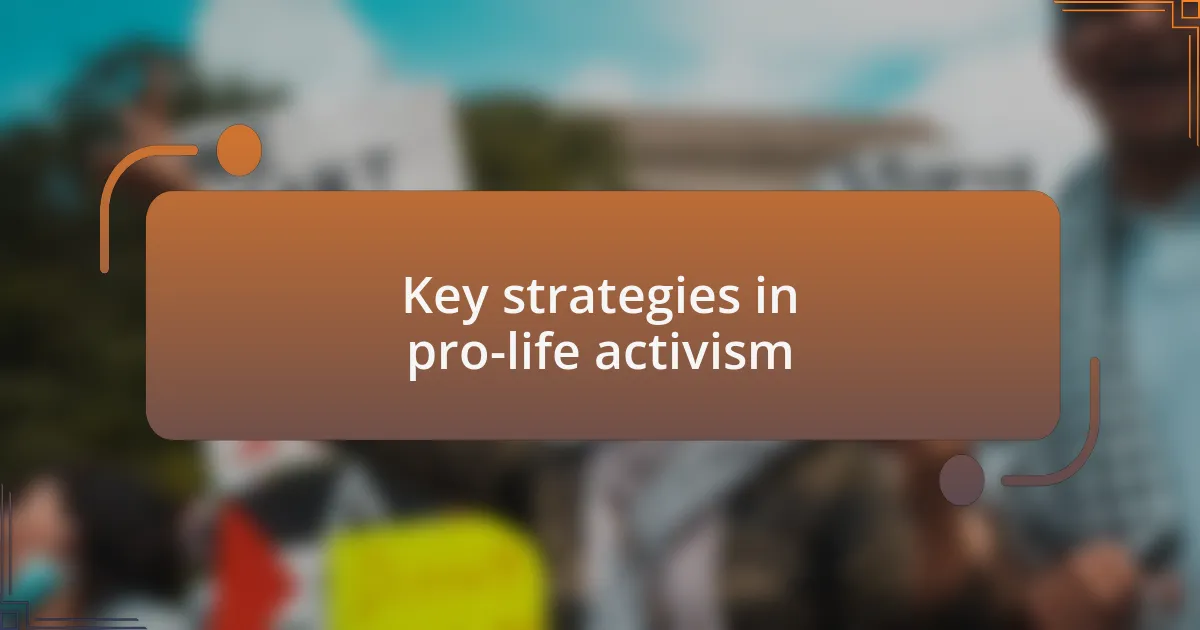
Key strategies in pro-life activism
One key strategy in pro-life activism is building strong, empathetic connections within the community. I remember organizing events where people shared their stories about pregnancy, loss, and hope. These gatherings fostered an environment where emotional experiences took center stage. It made me realize how powerful it is to listen; when individuals feel heard, they are more likely to engage in meaningful discussions about the pro-life cause.
Another effective approach is leveraging social media to reach a wider audience. I often utilize my own platforms to share information and personal reflections related to life advocacy. One post I made about a friend who chose adoption sparked numerous conversations, demonstrating how stories can resonate deeply. Aren’t we all drawn to narratives that reflect our values? Using storytelling, I believe we can twist the narrative around pro-life issues, transforming perceptions one shared experience at a time.
Lastly, education plays a critical role in pro-life activism. During my time volunteering at workshops, I often encountered misinformation that clouded people’s understanding of life issues. I discovered that by equipping advocates with accurate information and training, we empower them to counteract misconceptions. Doesn’t making informed choices matter to everyone? As I saw participants gain confidence in their knowledge, I sensed a ripple effect—individuals becoming advocates in their circles, creating a broader impact.
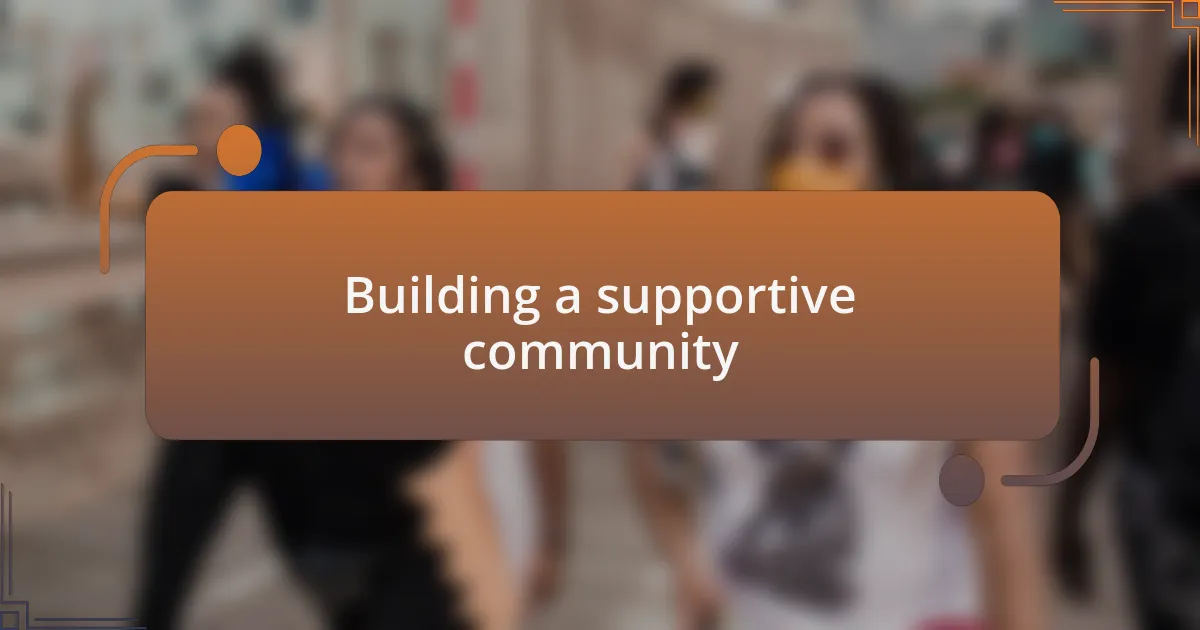
Building a supportive community
A supportive community is built on trust and shared experiences. I recall a particularly moving evening spent with a small group of advocates who gathered to discuss our motivations. As we shared our personal journeys, the feeling of vulnerability and connection was palpable. It struck me that when we open up about our struggles and triumphs, we create an environment that fosters compassion and understanding. Have you ever experienced that moment when someone else’s story mirrors your own?
Regular meet-ups not only enhance relationships but also provide opportunities for collaboration. I once facilitated a brainstorming session where we mapped out strategies for our outreach efforts. The diversity of ideas that emerged was remarkable; it showed me that when different voices come together, we can create a symphony of support. Isn’t it inspiring to see how collective energy can transform individual motivations into impactful actions?
Additionally, offering a safe space for discussions on sensitive topics can be profoundly healing. I remember hosting a roundtable for parents who faced unplanned pregnancies. Seeing them engage openly, support one another, and express their fears and hopes deepened my belief in community. Isn’t it a relief to know that we don’t have to navigate these journeys alone? A supportive community nurtures not just advocacy, but personal growth, compassion, and resilience.
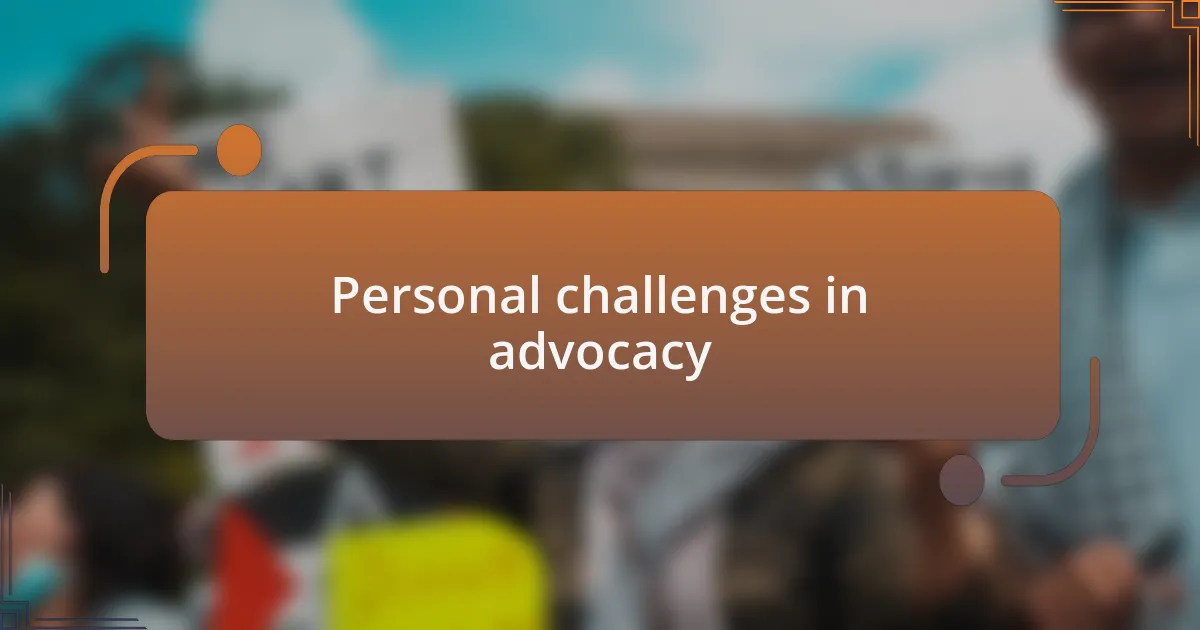
Personal challenges in advocacy
Advocacy often feels like a double-edged sword, especially when navigating personal challenges. I remember the first public event I attended to speak about my pro-life beliefs. The anxiety was overwhelming, and even though I had a well-prepared speech, my heart raced with fear of rejection. Has that ever happened to you? Standing before a group of people, I realized that what I was advocating for was not just a belief—it was a deeply personal part of my identity, and the weight of that responsibility felt heavy.
Another hurdle I’ve faced is dealing with backlash. I distinctly recall a social media post where I shared my stance on life issues, only to receive an avalanche of criticism. It was disheartening to see others attack not just the message but my character. I wondered, how could someone view my passion as ignorance? This experience taught me resilience and the importance of self-affirmation in the face of adversity. I drew strength from supportive friends who reminded me that differing opinions do not invalidate my beliefs.
When we advocate for change, personal sacrifices are often part of the journey. I once dedicated a weekend to organizing a local workshop, only to realize I had neglected my own self-care. Exhaustion crept in, leaving me questioning whether the effort was worth the toll it took on my personal life. Have you found yourself caught in a similar struggle? Balancing advocacy with personal well-being is an ongoing challenge, but it highlights the need for self-compassion amidst our efforts to create change.
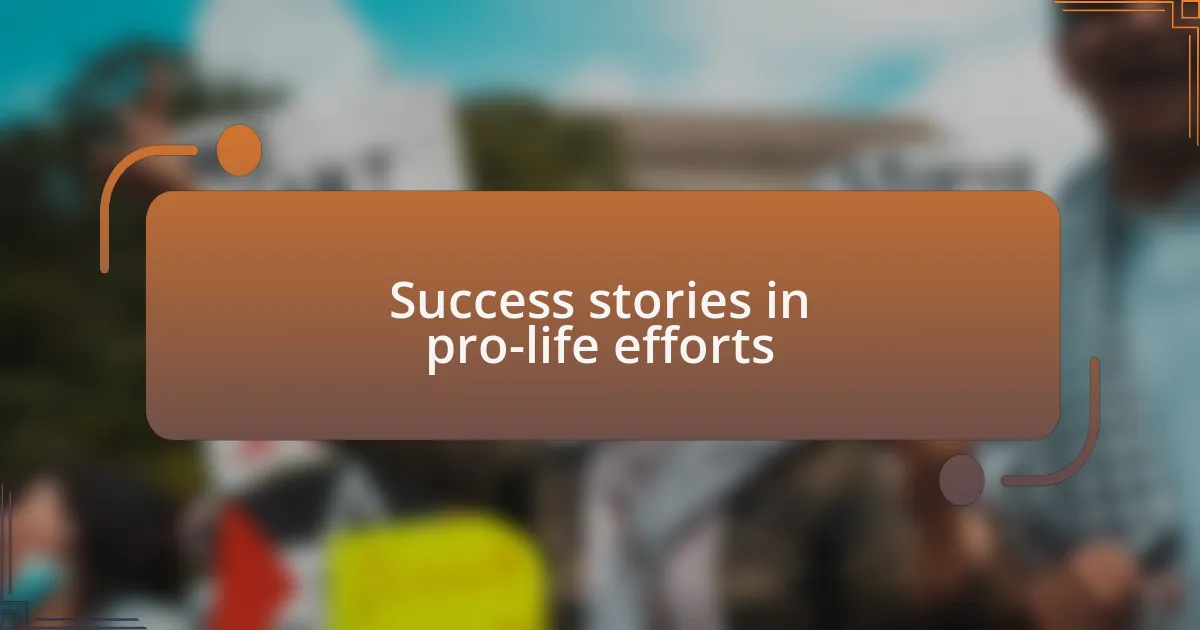
Success stories in pro-life efforts
One of the most inspiring success stories I’ve encountered in pro-life advocacy happened at a community event aimed at raising awareness about prenatal care. I remember a young mother who shared her journey of choosing life against all odds. Her heartfelt testimonial resonated with everyone; it not only highlighted the importance of support in making life-affirming choices but also sparked discussions on how our community could do more to assist mothers in need. Have you ever witnessed how one story can shift perspectives? It was a powerful reminder that personal narratives can change lives.
Another notable success came when a coalition of pro-life organizations in my area banded together to establish a pregnancy resource center. When I first heard about the initiative, I was skeptical—would it truly make a difference? However, within the first year, the center had already assisted hundreds of women and provided essential resources like parenting classes and counseling. Seeing firsthand how this collective effort transformed lives reinforced my desire to advocate for comprehensive support systems. Doesn’t it feel uplifting to know that together we can create tangible change?
I can’t help but reflect on the impact of educational campaigns in schools about the sanctity of life. A local high school incorporated a pro-life club, and the students organized a ‘Life Awareness Week.’ The dialogue it sparked was incredible. Students who previously hadn’t considered these issues opened up, asking questions and participating in discussions. I found it exhilarating to see young minds grappling with such profound topics. Isn’t it comforting to realize that just by encouraging conversation, we can plant seeds of compassion and understanding in future generations?
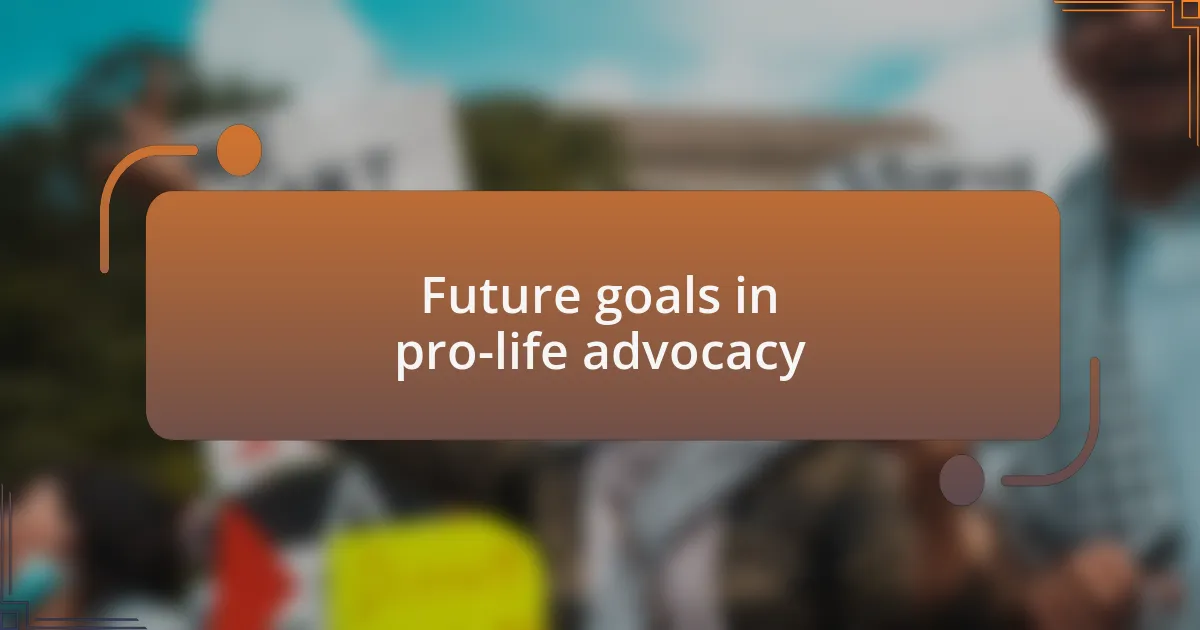
Future goals in pro-life advocacy
As I look toward the future of pro-life advocacy, I see a growing need for enhanced education around reproductive health options. One of my goals is to create workshops that empower young people with knowledge, helping them understand the emotional and physical impacts of their choices. Can you imagine how much stronger our movement would be if we equipped the next generation with compassion and informed choices from an early age?
Furthermore, I hope to expand our outreach efforts to underserved communities where the pro-life message often struggles to find a voice. During a recent community meeting, I learned from a young woman who felt isolated and unsupported; it opened my eyes to the importance of ensuring that every individual has access to the information and resources they need. It’s not just about sharing our message—it’s about making personal connections and truly understanding the unique challenges faced by different communities.
Looking ahead, engaging local policymakers is crucial for establishing supportive legislation that protects both mothers and children. I’ve witnessed the frustration when policies ignore these critical aspects of family life. By advocating for laws that protect life and provide essential support, I believe we can foster a culture that values and uplifts every individual. What if we worked together to ensure that every voice is heard in the halls of power? The potential for change is immense, and I am determined to be part of that wave.